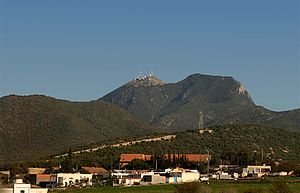Djebel Boukornine
| Djebel Boukornine | ||
|---|---|---|
 Golf von Tunis mit Blick auf den Djebel Boukornine | ||
| Höhe | 576 m | |
| Lage | Tunesien | |
| Koordinaten | 36° 42′ 18″ N, 10° 20′ 0″ O | |
Der Djebel Boukornine oder Djebel Bou Kornine (arabisch جبل بوقرنين) ist ein maximal 576 m hohes Küstengebirge südöstlich der tunesischen Hauptstadt Tunis unweit des Golf von Tunis. Es gehört zur Dorsale und besteht im Wesentlichen aus zwei markanten Gipfeln, deren kleinerer 493 m hoch ist.
Toponym
Der Name stammt wahrscheinlich aus dem phönizischen Ba'al Kornine, was so viel bedeutet wie der „Herr mit den zwei Hörnern“. Aus römischer Zeit ist der Name Balcaranensis überliefert.
Besteigung
Eine Besteigung der beiden Gipfel ist möglich; doch befinden sich dort zwei Wetter- und Funkstationen.
Naturschutzgebiet
Knapp 2000 Hektar des Gebiets des Djebel Boukornine sind als Naturschutzgebiet ausgewiesen. Vorherrschende Bäume sind Aleppo-Kiefern und Thujen. In den Wäldern leben Raubvögel und Füchse, die sich von Kleinsäugern ernähren, aber auch Wildschweine und Stachelschweine wurden bereits gesichtet. In den Jahren 2011 und 2014 wurden Teile des Waldes Opfer von Feuern.
Siehe auch
- Liste der Berge oder Erhebungen in Tunesien
- Djebel Ressas
Weblinks
- Franz Cumont: Balcaranensis. In: Paulys Realencyclopädie der classischen Altertumswissenschaft (RE). Band II,2, Stuttgart 1896, Sp. 2822 f.
Auf dieser Seite verwendete Medien
Autor/Urheber: Dr Brains, Lizenz: GFDL 1.2
Positionskarte von Tunesien
Autor/Urheber: Nicholas.gosse, Lizenz: CC BY-SA 4.0
A collection of contemporary photos, dedicated to the people of Tunisia
I dedicate this collection of photographs to the people of Tunisia, where I had the great privilege to live, work , explore and photograph between 2002 and 2006. Apart from the natural beauty and climate, what remains deepest in my memory is the warmth and friendship of the people and a national pride driven by the heartbeat of culture and civilisation. I hope that this selection of photos conveys some of that. The importance of Tunisia’s growth as a nation post World War II, and the example it set in gender equality and education are second to none. Tunisia was prepared to challenge and change; it is a beacon to all seeking equality, justice and peace.
Nicholas Gosse, 2015



